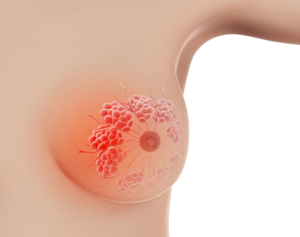Breast Pain

Breast pain involves any discomfort or pain in the breast, such as premenstrual tenderness.
There are many possible causes for breast pain. For example, hormonal fluctuations related to menstruation or pregnancy is often responsible for breast tenderness. Some degree of swelling and tenderness just before your period is normal. The question is how tolerable (or intolerable) the discomfort is to you.
Although many women with pain in one or both breasts understandably fear Breast Cancer, breast pain is NOT a common symptom of cancer.
Boys and men have breast tissue. As a normal part of development, adolescent boys can have some breast swelling and tenderness. Like breast tenderness in women, this is due to hormonal changes.
Other common causes of Breast Pain include:
- Puberty - in both girls and boys
- Breast feeding
- Approach of menopause (once your menstrual periods have stopped completely, breast tenderness often goes away unless you are taking hormone replacement therapy)
- Soon after childbirth, your breasts may become engorged with milk. This can be very painful and is usually accompanied by swelling. If you also have an area of redness, call your health care provider.
- Fibrocystic breast changes: Breast lumps and bumps throughout the breast tissue that tend to be more tender just before your menstrual period
- Mastitis – A blocked and infected milk duct that may have some redness, usually associated with breastfeeding
- Premenstrual Syndrome (PMS)
- Alcoholism with liver damage
- Injury
- Certain medications may also cause breast pain
- Shingles can lead to pain felt in the breast if the painful blistering rash appears on the skin over one of your breasts.
For tips on how to manage pain from fibrocystic breasts, see breast lumps.
Talk to your doctor about possibly taking birth control pills. These can help relieve pain.
If you have a breast infection, you will need antibiotics. Look for signs of infection like localized redness, nipple discharge, or fever. Contact your doctor if you have these signs.
Just after an injury to the breast occurs, apply a cold compress such as an ice pack (wrapped in a cloth — don’t apply directly to the skin) for 15 to 20 minutes. Take a nonsteroidal anti-inflammatory drug (NSAID) such as ibuprofen to reduce the likelihood of developing persistent breast pain or swelling.
Call your doctor if you have:
- Discharge from your nipples, especially blood or pus
- Given birth within the last week and your breasts are swollen or hard
- Signs of a breast infection, including localized redness, pus, or fever
- Notice a new lump associated with the pain that does not go away after your menstrual period
- Persistent, unexplained breast pain
Your health care provider will perform a breast examination and ask questions about your breast pain-
- Breast Biopsy
- Culture of nipple discharge to test for infection
- Cytology (microscopic evaluation) of nipple discharge
- Mammography
- Fine needle aspiration - A small needle is inserted into the breast to remove fluid that may have collected in a cyst (usually not cancerous)
Treatment may include the following:
- Pain relievers may be prescribed.
- Changes to your diet may be suggested.
- Certain medications may be changed or discontinued.
Your health care provider should schedule a follow-up visit in case the symptoms have not resolved in a given period of time. He or she may recommend consultation with a specialist if the symptoms do not go away or if you have a complicated condition.
Prevention
Wear a well-fitting brassiere for support, especially if your breasts are large.
Perform a monthly breast self-exam 3-5 days after your period (when the breast tissue is the least tender). This is important to feel for any changes in your breast tissue. If you detect any change from the previous month, it is important to notify your doctor.





